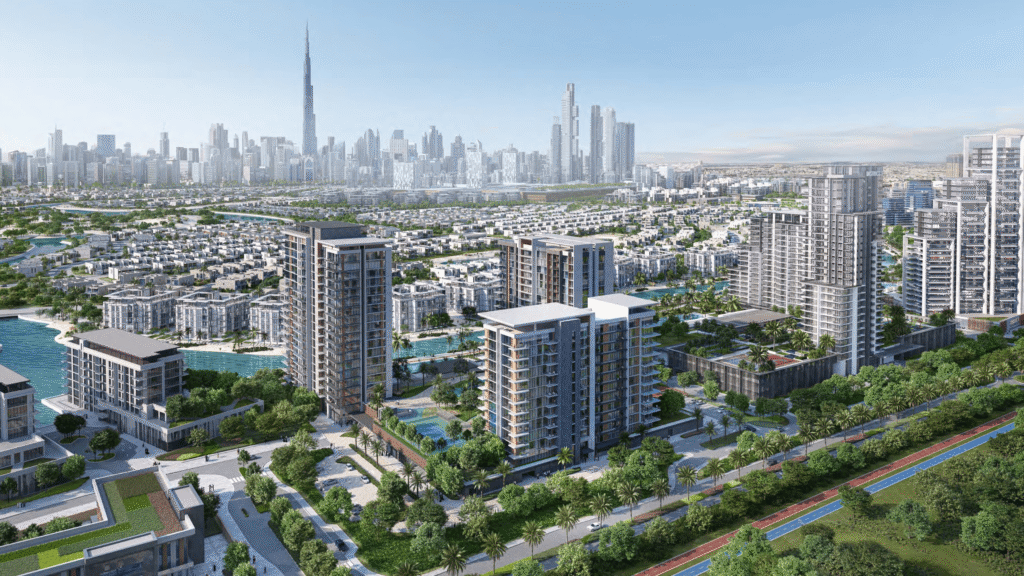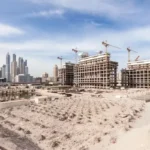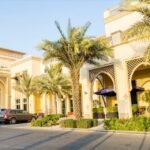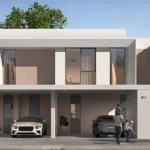Now Reading: Dubai Real Estate: 6 Emirates-Level Tax Reforms Shaping Investment Trends in 2025
-
01
Dubai Real Estate: 6 Emirates-Level Tax Reforms Shaping Investment Trends in 2025
Dubai Real Estate: 6 Emirates-Level Tax Reforms Shaping Investment Trends in 2025

Table of Contents
Emirates-Level Tax Reforms: Dubai’s real estate market, valued at AED 761B in 2024 (226,000 transactions, 36% year-on-year growth), remains a global investment hub, offering apartments (AED 1.2M–5M) and villas (AED 5M–20M) with 6–9% ROI and 8–12% appreciation by 2028. Prime areas like City Walk, Dubai Creek Harbour, and Meydan City recorded AED 25.9B in combined sales in 2024, driven by luxury projects, tourism (21M visitors), and infrastructure like the Burj Khalifa and Dubai Metro.
The UAE’s emirates-level tax reforms zero personal income tax, zero capital gains tax, zero inheritance tax, VAT exemptions on residential properties, free zone corporate tax benefits, and Golden Visa enhancements create a tax-efficient environment, fueling 70% of demand from foreign investors.
Supported by the Dubai 2040 Plan, a 6.2% GDP growth forecast for 2025, 95% absorption, and RERA escrow protections, these reforms enhance transparency and investor confidence. This guide details six key tax reforms, their impact on investment trends, and opportunities in Dubai’s real estate market, backed by 2024–2025 data.
1. Zero Personal Income Tax
- Reform Details: The UAE maintains a 0% personal income tax rate on rental income from properties, unlike markets with 20–45% taxes (e.g., UK, US). Investors retain full rental returns (e.g., AED 80K–500K/year for AED 1.2M–20M properties).
- Implementation: Applies to all individual buyers in freehold zones (e.g., City Walk, Dubai Marina). No tax filing is required with the Federal Tax Authority (FTA), simplifying compliance.
- Impact on Investment Trends: Saves AED 16K–200K annually on rentals, boosting net ROI by 1–2%. In 2024, 65% of transactions (AED 494B) were individual-owned, with City Walk (AED 5.2B) and Meydan (AED 8.5B) leading. Encourages long-term holding for rental income, especially in high-demand areas like Jumeirah Village Circle (7–9% ROI).
- Opportunities: Invest in City Walk’s Central Park Towers (1–4-bedroom apartments, AED 1.5M–4M, rentals AED 80K–200K/year) or Meydan’s Azizi Riviera (apartments, AED 1.2M–3M, rentals AED 80K–200K/year) for tax-free rental yields.
2. Zero Capital Gains Tax
- Reform Details: No capital gains tax applies to property sale profits, unlike 20–28% in other markets. For example, a Dubai Creek Harbour apartment bought for AED 1.5M in 2023 and sold for AED 2.1M in 2025 yields AED 600K tax-free profit.
- Implementation: Available to individual and corporate sellers in freehold zones. No FTA reporting is needed for individuals, ensuring simplicity.
- Impact on Investment Trends: Retains full profits (e.g., AED 300K–2M on AED 1.2M–10M properties), reducing effective costs by 15–20% over five years. In 2024, Dubai saw 28.9% YoY price growth (AED 1,558 psf primary market), with off-plan sales (60% of transactions) driving gains. Encourages investment in high-appreciation areas like Dubai Creek Harbour (25–30% gains by 2028).
- Opportunities: Target Dubai Creek Harbour’s Creek Waters (apartments, AED 1.5M–4M, 20–25% projected gains) or Meydan One (apartments, AED 1.5M–5M, 25–30% gains) for tax-free capital appreciation.
3. Zero Inheritance Tax
- Reform Details: Properties can be transferred to heirs without inheritance tax, unlike markets with 40% estate taxes (e.g., UK). Non-Muslims can register wills at DIFC Wills Service Centre (AED 10K–15K) for seamless transfers.
- Implementation: Applies to all property owners in freehold zones. DIFC will registration is recommended for non-residents to ensure legal clarity.
- Impact on Investment Trends: Eliminates tax liability (e.g., AED 2M–8M on AED 5M–20M properties), encouraging legacy investments. In 2024, 15% of buyers (AED 114B) cited inheritance benefits, particularly in Meydan’s Mohammed Bin Rashid City (AED 12M–20M villas). Drives demand from HNWIs (6,700 relocated to Dubai in 2024).
- Opportunities: Invest in Meydan’s Karl Lagerfeld Villas (AED 15M–20M) or City Walk’s La Ville Apartments (AED 2M–4.5M) for tax-free generational wealth transfers.
4. VAT Exemptions on Residential Properties
- Reform Details: Residential property purchases (first supply) are zero-rated, and leases are VAT-exempt, unlike commercial properties (5% VAT). Input VAT on maintenance (AED 10K–100K/year) is recoverable for FTA-registered buyers.
- Implementation: Applies to residential properties in freehold zones. VAT recovery requires FTA registration (taxable supplies above AED 375K) and quarterly filings. Non-compliance risks penalties (AED 10K–50K).
- Impact on Investment Trends: Saves 5% on purchases (e.g., AED 60K–250K on AED 1.2M–5M apartments) and 20–40% on expenses, reducing ownership costs. In 2024, 70% of transactions (AED 532B) leveraged VAT exemptions, with City Walk’s Building 5 (AED 1.8M–5M) and Dubai Creek Harbour’s Creek Beach (AED 1.5M–4.5M) benefiting. Drives demand for off-plan properties (60% of sales).
- Opportunities: Target City Walk’s Residential 16 (apartments, AED 1.5M–3.8M, handover Q1 2027) or Dubai Creek Harbour’s Creek Palace (apartments, AED 1.8M–4M) for VAT-free purchases and high yields (6–8%).
5. Free Zone Corporate Tax Benefits
- Reform Details: Free zones like Meydan Free Zone offer 0% corporate tax on qualifying income (e.g., revenue from international clients or other free zones) for businesses owning properties, provided non-qualifying income stays below 5% or AED 5M. Investors can structure ownership via free zone entities to optimize taxes.
- Implementation: Requires registration in free zones (e.g., Meydan, Dubai South), compliance with Qualified Free Zone Person (QFZP) rules, and clean financial records. Non-compliance risks 9% corporate tax.
- Impact on Investment Trends: Saves 9% on corporate-held property income (e.g., AED 90K on AED 1M revenue), enhancing returns for HNWIs using corporate structures. In 2024, 10% of transactions (AED 76B) used free zone entities, particularly in Meydan One (AED 1.5M–10M). Encourages corporate investment in mixed-use projects.
- Opportunities: Invest in Meydan’s The Wilds (mixed-use properties, AED 5M–15M) or Dubai Creek Harbour’s Island District (apartments, AED 1.2M–3.5M) via free zone entities for tax-efficient returns.
6. Golden Visa Enhancements
- Reform Details: Property purchases above AED 2M qualify for a 10-year renewable UAE residency visa, reducing relocation costs and enhancing investment appeal. Recent 2024 reforms lowered administrative hurdles, streamlining applications.
- Implementation: Open to all buyers (resident or non-resident) in freehold zones. Requires DLD verification, passport copy, and proof of funds. No tax residency status required.
- Impact on Investment Trends: Eliminates visa costs (AED 5K–20K/year) and drove 35% of 2024 transactions (AED 266B), particularly in City Walk (AED 3B). Boosts long-term holding, with 25% of buyers citing residency benefits. Supports demand in mid-range and luxury segments (e.g., JVC, Palm Jumeirah).
- Opportunities: Target City Walk’s Building 13B (apartments, AED 1.2M–3.5M) or Meydan’s District One (villas, AED 12M–20M) for residency benefits and 6–8% ROI.
Market Trends and Outlook for 2025
- Yields and Appreciation: Dubai offers 6–9% ROI (apartments 7–9%, villas 6–8%) and 8–12% appreciation, driven by AED 761B in 2024 sales and 20% rental growth. Off-plan sales (60% of transactions) dominate, with 182,000 units expected in 2025–2026.
- Tax Environment: Zero personal income, capital gains, and inheritance taxes, plus VAT exemptions and free zone benefits, minimize tax risk. The 4% RETT (2% buyer) can be reduced to 0.125% via gift transfers, saving AED 19K–79K on AED 1M–4M properties.
- Infrastructure Impact: Dubai 2040 Plan, metro expansions, and landmarks like Burj Khalifa boost values by 5–10%. Tourism (21M visitors in 2024) and 80% occupancy drive rental demand.
- Investor Drivers: Golden Visas, 100% foreign ownership, and flexible payment plans (5–10% down) fuel 70% of demand. Dubai’s affordability (AED 1,200–1,800 psf vs. AED 3,000 in Palm Jumeirah) attracts mid-income and HNWI buyers.
- Risks: Oversupply (182,000 units by 2026) and AML compliance costs (AED 2K–5K) pose a 10–15% correction risk in H2 2025. Mitigated by 95% absorption, RERA escrow accounts, and DLD oversight.
- Regulatory Framework: DLD and RERA ensure transparency with 4% RETT. Escrow laws protect off-plan investments (e.g., Creek Waters, handover Q3 2026). Freehold zones allow inheritance rights. Blockchain-based transactions enhance security.
Investment Strategy
- Diversification: Invest in City Walk’s Central Park Towers (AED 1.5M–4M, 6–8% ROI) for mid-range yields, Dubai Creek Harbour’s Creek Waters (AED 1.5M–4M, 20–25% gains) for appreciation, or Meydan’s Karl Lagerfeld Villas (AED 15M–20M, 6–8% ROI) for luxury. Off-plan projects offer higher gains.
- Entry Points: Off-plan units (5–10% down) like City Walk Residential 16 provide flexibility. Completed units in City Walk’s Building 5 suit immediate rentals (AED 80K–250K/year).
- Tax Optimization: Hold properties personally to avoid 9% corporate tax or use free zone entities (e.g., Meydan Free Zone) for corporate tax exemptions. Use gift transfers (0.125% RETT) or payment plans to reduce costs. Recover input VAT and consult advisors like Shuraa Tax for FTA compliance.
- Process: Verify tax benefits via DLD or FTA. Pay 2% buyer RETT and secure NOC. Use platforms like Property Finder or dxboffplan.com. Required documents: passport copy, proof of funds, no UAE visa needed. Documents must be translated into Arabic and legalized.
Conclusion
In 2025, Dubai’s real estate market, backed by AED 761B in 2024 sales, offers 6–9% ROI and 8–12% appreciation, driven by six emirates-level tax reforms: zero personal income, capital gains, and inheritance taxes, VAT exemptions, free zone corporate tax benefits, and Golden Visa enhancements. These reforms minimize tax risk and fuel 70% foreign investment in areas like City Walk, Dubai Creek Harbour, and Meydan. Despite a 10–15% correction risk, 95% absorption and RERA protections ensure stability. Emirates Investment
read more: City Walk Dubai: 5 Boutique Developments With Low Tax Risk Profiles in 2025



















